
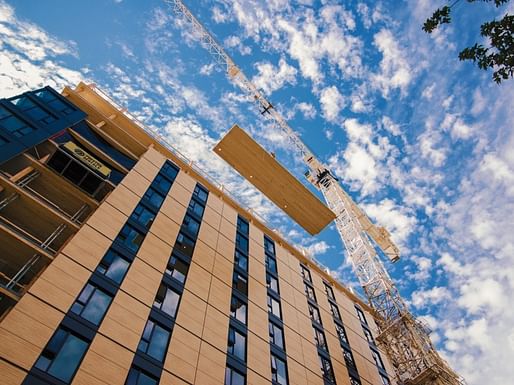
The Softwood Lumber Board and the Association of Collegiate Schools of Architecture (ACSA) have announced the winners of the 2022 Timber Education Prize. The selected courses will be taught in architecture schools across North America in the coming years and provide an excellent insight into the future of design education.
With mass timber's popularity increasing over the years, it has become a difficult building material to obtain as of late. As a result, students preparing to enter the field of architecture and construction must learn the techniques and applications that fall in line with mass timber trends affecting the industry. This year's winning courses have been recognized for their "effective and innovative curricula that create a stimulating and evidence-based environment for learning about timber."
The jury selected five courses representing the best entrants to this year's contest. In addition, three honorable mention courses were chosen as well. Each winner will receive a cash prize that will aid in delivering each course within the next two years.
Scroll down for a look at this year's winners.
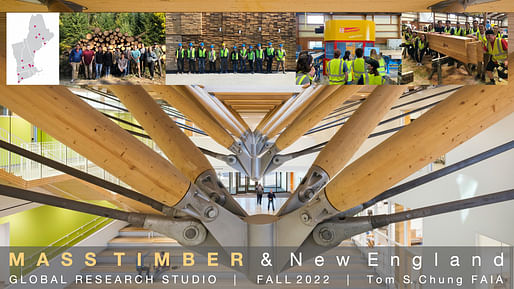
MASS TIMBER AND NEW ENGLAND by Tom S. Chung
Institution: Wentworth Institute of Technology
Details: Mass Timber has tremendous potential to address issues of climate change, disrupt outdated construction processes and create unique spaces that promote user well-being. We investigate these potentials through research and apply them in a design project. Studio travel thru New England gives students direct exposure to all major elements of Mass Timber architecture:
Studio begins with analysis of mass timber precedents, each selected for a specific creative approach. This exercise equips the studio with a wide catalog of references for inspiration and approach to mass timber design, tectonics, details, construction and spatial quality. Students are then tasked with “inventing” their own mass timber panel, beyond available products such as CLT, NLT, DLT & MPP to investigate mass timber’s architectural and structural potential regarding material reuse, efficiency, systems integration and aesthetics & spatial quality. Studio culminates in a semester long design project, a synthesis of their research, analysis and explorations of mass timber.
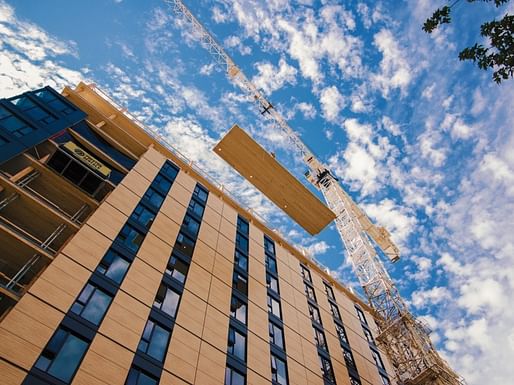
MASS TIMBER BUILDING SYSTEMS: ARCHITECTURE 595 by Paul Fast
Institution: University of Illinois at Urbana-Champaign
Details: Timber, particularly mass timber, is an emerging material within USA and as building structure is cultural, visual, and experiential. It is a sustainable material that becomes a predominant design element due to its scale, exposed surfaces, and haptic qualities. To take advantage of the character of mass timber, architects need exposure to the technical aspects of the material. Building with mass timber is still very much in its infancy in North America, yet it is experiencing burgeoning interest in the industry, necessitating the need for architects and engineers that are fluent in the design of this particular material and construction system.
In this course, students will learn structural design concepts using mass timber and integrate them with building systems. They will also gain knowledge about sustainability aspects as well as manufacturing, pre-fabrication, procurement and erection of mass timber systems. Student’s learning will cover subjects including case histories of built mass timber projects in the transportation, commercial and institutional design sectors.
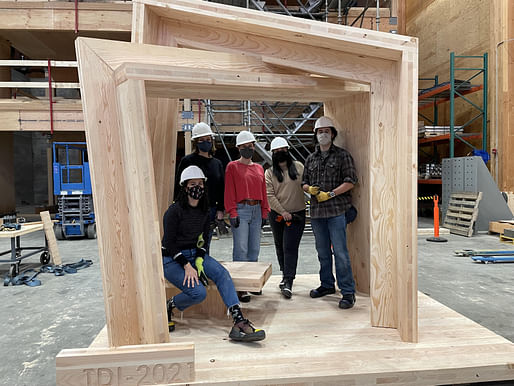
MASS TIMBER DESIGN FOCUS IN OUR MASTER OF SCIENCE IN ARCHITECTURE DEGREE PROGRAM by Judith Sheine
Institution: University of Oregon
Details: The Department of Architecture at the University of Oregon (UO) initiated a new focus in Mass Timber Design within our existing Master of Science degree program in fall 2021. This focus is designed to fulfill the requirements for a one-year 45 credit (minimum) post-professional degree program for students who have an accredited degree in architecture and want to focus a year of study on topics in advanced timber design. This program takes advantage of the resources of the TallWood Design Institute (TDI), a collaboration between UO’s College of Design and Oregon State University’s (OSU) Colleges of Forestry and Engineering that promotes environmental stewardship and economic development through research, testing, outreach, and education focused on the advancement of sustainably sourced engineered timber products (tallwoodinstitute.org); ; the program includes courses and faculty advisors at both UO and OSU. This focus within the MS degree is the first step in what is intended to become a joint UO-OSU Master’s degree program in Mass Timber Design with participation by the three Colleges that collaborate in TDI, for students with undergraduate degrees in the disciplines of architecture, wood science, civil and construction engineering.
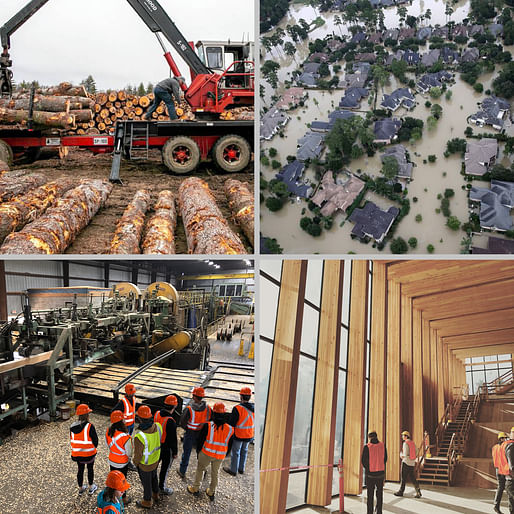
FOREST STRONG: TIMBER SOLUTIONS FOR DISASTER RESILIENT COASTAL DEVELOPMENT by Jacob Gines and Hans Hermann
Institution: Mississippi State University
Details: Mississippi is Forest Strong. The state contains approximately 19.8 million acres of forested land, which accounts for 64 percent of Mississippi’s total area. The value of timber harvesting in Mississippi has averaged in excess of $1 billion per year over the past 20 years and accounts for over 60,000 jobs in the state. The careful planning and execution of sustainable silviculture, forest management practices, and harvesting of timber has strategic long-term benefits for Mississippi. At the same time, Mississippi is vulnerable. The increased frequency of catastrophic weather events places our communities and businesses at significant risk. The Mississippi Gulf Coast is particularly vulnerable to hurricanes and other severe weather systems that continually devastate its heavily populated coastlines. In order for Mississippi to be truly strong, we must find innovative ways to construct the built environment for a resilient future.
The course, Forest Strong: Timber Solutions for Disaster Resilient Coastal Development, is proposed to take place in the fourth-year integrative design studio at Mississippi State University. It will explore mass timber and other innovative wood products as catalysts for architectural solutions that address the impacts and realities of severe weather events. The course will endeavor to better understand the issues surrounding climate change and coastal resiliency by working directly with our strategic partners, the Gulf Coast Community Design Studio and the Mississippi Forestry Association. Through these partnerships, the studio will have the opportunity to visit a sustainably managed forest and meet with a licensed forester to discuss forest ecology, silviculture practices and certified management strategies while also tour a local saw mill where studio participants will become better acquainted with timber optimization and machine automation as logs are transformed into dimensional lumber and other wood products. Knowledge of material history, properties and potentials will be essential to the student’s development of architectural proposals throughout the course. Leveraging other local assets such as the expertise of the MSU Sustainable Bioproducts faculty and nationally noted mass timber design professionals, students will learn how to calculate embodied energy and provide comparative analysis across several material selections as well as the amount of sequestered carbon their mass timber structure contains for additional comparative analysis.
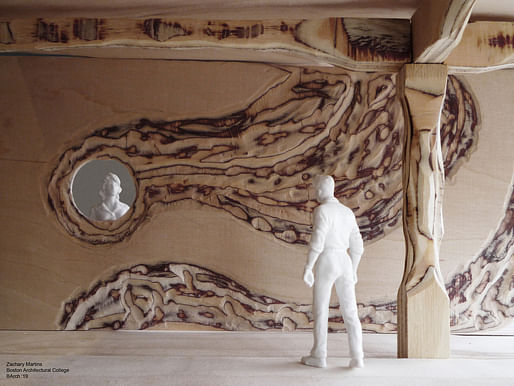
TIMBER SUPER-BLOCK by Nelson Byun
Institution: Boston Architectural College
Details: The studio will explore the potentials of mass-timber as a sustainable technology and catalyst for novel architecture in the design of a speculative super-block complex at the Seaport Innovation District of Boston, MA. It recognizes wood as an abundant and renewable natural resource that sequesters carbon when it grows and how the utilization of mass-timber on large-scale architecture can make it a carbon sink, rather than source. Thus, reducing the greenhouse gas steering global climate change in an impactful way. Furthermore, mass-timber has tectonic and aesthetic qualities beyond traditional building materials, presenting a design opportunity to change how we see and experience our built environment.
View more details of the 2022 Timber Education Prize Awards here.
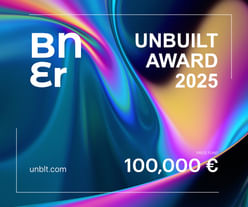
100,000 € Prize / Buildner's Unbuilt Award 2025
Register by Thu, Oct 30, 2025
Submit by Thu, Nov 20, 2025
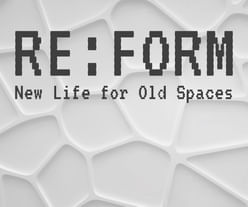
Re:Form – New Life for Old Spaces
Register by Wed, Jan 22, 2025
Submit by Tue, Sep 2, 2025

Land Art Generator Initiative 2025 Fiji: Climate Resilience for Island Communities
Register/Submit by Mon, May 5, 2025

MICROHOME Kingspan 2024/25
Register by Thu, Feb 13, 2025
Submit by Tue, Mar 18, 2025
No Comments